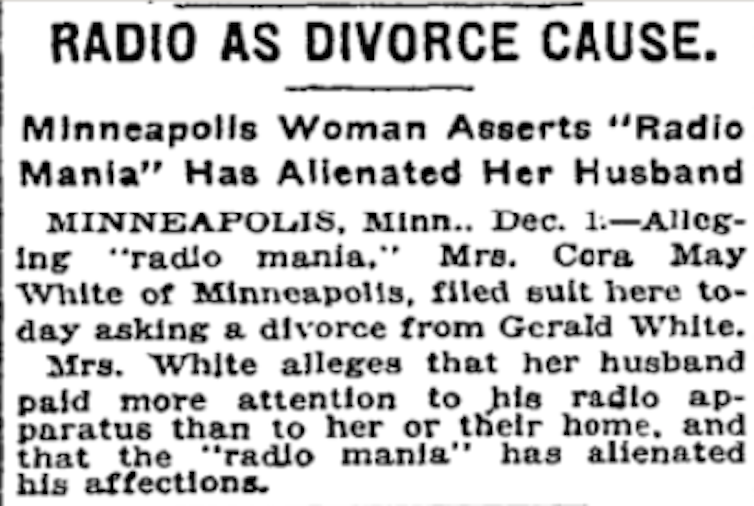
It began with a basic “news you can use” feature from National Public Radio. Titled “5 ways to cope with the stressful news cycle,” producer Andee Tagle’s piece, published in late February, offered tips on how to cope with anxiety caused by news consumption in tense times.
Among Tagle’s tips: “Do something that feels good for your body and helps you get out of your head.” Also: “The kitchen is a safe space for a lot of us. Maybe this is the weekend that you finally re-create Grandpa’s famous lasagna … or maybe just lose yourself in some kitchen organization.”
Tagle’s simple self-help counsel quickly ignited social media scorn, seemingly touching a nerve among numerous commentators.
National Review’s Dan McLaughlin tweeted that the piece indicated that NPR employees “really do not envision their audience as grown adults.”
“I’m all for mental health awareness and therapeutic care,” tweeted Daily Beast editor Anthony Fisher, before ultimately dismissing Tagle’s article as “a lifestyle guide for narcissists.”
The piece and its condemnation raise issues involving research about the mental and psychological toll of everyday news consumption that’s gone largely unnoticed by the public over the last few years. Recent surveys and research on the subject have only occasionally been publicized in the general press. The COVID-19 global pandemic — and the doomsday news reports it sparked — attracted a bit more attention to this research.
Yet the mental and psychological toll of news consumption remains largely unknown to the general news consumer. Even if the research isn’t widely known, the emotions felt by what one Northwestern University Medical School article called “headline stress disorder” probably exist for an certain unknown proportion of news consumers. After all, if these feelings didn’t exist for at least some of their listening audience, NPR would never have published that piece. Nor would Fox News have published a similar article to help its viewers cope.
 The news can wreak a mental and psychological toll on some people. DjelicS via Getty Images
The news can wreak a mental and psychological toll on some people. DjelicS via Getty Images
News threatens mental stability
The idea that more news, delivered faster through new and addicting technologies, can cause psychological and medical harm has a long history in the United States.
Media scholars like Daniel Czitrom and Jeffrey Sconce have noted how contemporaneous research linked the emergence and prevalence of neurasthenia to the rapid proliferation of telegraphic news in the late 19th century. Neurasthenia is defined by Merriam-Webster as “a condition that is characterized especially by physical and mental exhaustion usually with accompanying symptoms (such as headache and irritability).” Early 19th-century scientific exploration in neurology and psychiatry suggested that too much news consumption might lead to “nervous exhaustion” and other maladies.
In my own research into social psychology and radio listening, I noticed the same medical descriptions recurring in the 1920s, once radio became widespread. News reports chronicled how radio listening and radio news consumption seemed to threaten some people’s mental stability.
One front-page New York Times article in 1923 noted that a woman in Minnesota was divorcing her husband on the then-novel grounds that he suffered from “radio mania.” The wife felt her husband “paid more attention to his radio apparatus than to her or their home,” which had apparently “alienated his affection” from her.
Similar reports of addiction, mania and psychological entanglement spawned by new media emerged again as television proliferated in the American home in the 1950s, and again with the proliferation of the internet.
The public discussion of psychological addiction and mental harm caused by new technologies, and the ensuing moral panics they spawn, appears periodically as new communication technologies emerge. But, historically, adjustment and integration of new media occurs over time, and disorders such as neurasthenia and “radio mania” are largely forgotten.
 A story from the Dec. 2, 1923, New York Times front page. New York Times archive
A story from the Dec. 2, 1923, New York Times front page. New York Times archive
Anxious about frightening news
“Headline stress disorder” might sound ridiculous to some, but research does show that reading the news can make certain subsets of news consumers develop measurable emotional effects.
There are numerous studies looking into this phenomenon. In general, they find some people, under certain conditions, can be vulnerable to potentially harmful and diagnosable levels of anxiety if exposed to certain types of news reports.
The problem for researchers is isolating the exact subset of news consumers this happens to, and describing precisely the effect that occurs in response to specific identified news subjects and methods of news consumption.
It is not only probable, but even likely, that many people are made more anxious by the widespread distribution of frightening news. And if a news consumer has a diagnosed anxiety disorder, depression, or other identified mental health challenge, the likelihood that obviously distressing news reports would amplify and inflame such underlying issues seems almost certain.
Just because popular culture manages to pathologize much of everyday behavior doesn’t mean identified problems aren’t real, as those skewering the NPR story implied.
We all eat; but some of us eat far too much. When that occurs, everyday behavior is transformed into actions that can threaten health and survival. Likewise, most of us strive to stay informed, but it’s likely that in certain situations, for certain people, staying informed when the news is particularly frightening can threaten their mental health.
[Over 150,000 readers rely on The Conversation’s newsletters to understand the world. Sign up today.]
Therefore, the question is not whether the problem is real, but how research might quantify and describe its true prevalence, and how to address the problem.
And that’s precisely why the NPR article caused such a stir. Many people who consume news without problem couldn’t fathom why others might benefit from learning how to cope with “headline stress disorder.”
In reality, the criticism aimed at NPR says nothing about those who find our current run of bad news particularly anxiety provoking. It does say a lot about the lack of empathy from those who would scoff at the idea.
Michael J. Socolow does not work for, consult, own shares in or receive funding from any company or organization that would benefit from this article, and has disclosed no relevant affiliations beyond their academic appointment.
This article is republished from The Conversation under a Creative Commons license.
-
New Zealand plans to end smoking by banning it for future generations
Exercise releases endorphins, and it doesn’t take much to reap the benefits — a study published in the American Journal of Psychiatry linked just an hour of exercise weekly with less depression. Do it any way you enjoy — we recommend dancing around the house.
Exercise releases endorphins, and it doesn’t take much to reap the benefits — a study published in the American Journal of Psychiatry linked just an hour of exercise weekly with less depression. Do it any way you enjoy — we recommend dancing around the house.
-
New Zealand plans to end smoking by banning it for future generations
If you’re in a slump, reach for a glass of orange juice. A study found that more vitamin C can elevate mood — and bolster your immune system. Decent sources include citrus, peppers, strawberries, broccoli, or a daily vitamin C supplement.
If you’re in a slump, reach for a glass of orange juice. A study found that more vitamin C can elevate mood — and bolster your immune system. Decent sources include citrus, peppers, strawberries, broccoli, or a daily vitamin C supplement.
-
-
New Zealand plans to end smoking by banning it for future generations
The outdoors may be especially beneficial to your mood if you sit at a computer. Try the Japanese tradition of forest-bathing — simply spending time in the woods is thought to alleviate boredom and hostility.
If you can go out barefoot, practice “grounding.” Health gurus like Deepak Chopra say that connecting to the subtle electrical charge of the Earth can help with stress, mood and pain.
The outdoors may be especially beneficial to your mood if you sit at a computer. Try the Japanese tradition of forest-bathing — simply spending time in the woods is thought to alleviate boredom and hostility.
If you can go out barefoot, practice “grounding.” Health gurus like Deepak Chopra say that connecting to the subtle electrical charge of the Earth can help with stress, mood and pain.
-
New Zealand plans to end smoking by banning it for future generations
Just 10 minutes spent petting a dog or a cat has been shown to reduce levels of a major stress hormone, according to a study conducted at Washington State University. Even watching animal videos can help, too — see it as self-care rather than procrastination.
Just 10 minutes spent petting a dog or a cat has been shown to reduce levels of a major stress hormone, according to a study conducted at Washington State University. Even watching animal videos can help, too — see it as self-care rather than procrastination.
-
-
New Zealand plans to end smoking by banning it for future generations
Putting on your favorite playlist can quickly boost your mood, and singing along is even better. Both upbeat and slower songs can help you release negative emotions.
Putting on your favorite playlist can quickly boost your mood, and singing along is even better. Both upbeat and slower songs can help you release negative emotions.
-
New Zealand plans to end smoking by banning it for future generations
Reflecting on things you enjoyed about your day or what you’re thankful for can help boost your mood over time, as it produces a positive mindset.
Sarah Moe, CEO of Sleep Health Specialists in Minneapolis, suggests clients who have trouble sleeping to say aloud three things they are grateful for before closing their eyes.
Hearing your own voice remind you what you have to be grateful for seems to improve relaxation and reduce stress, Moe says.
Reflecting on things you enjoyed about your day or what you’re thankful for can help boost your mood over time, as it produces a positive mindset.
Sarah Moe, CEO of Sleep Health Specialists in Minneapolis, suggests clients who have trouble sleeping to say aloud three things they are grateful for before closing their eyes.
Hearing your own voice remind you what you have to be grateful for seems to improve relaxation and reduce stress, Moe says.
-
-
New Zealand plans to end smoking by banning it for future generations
Being thankful or expressing gratitude can help with relationships, stress and depression. Work that into your daily routine with a gratitude journal.
Try writing down three good things about your day every day. A notebook or notes app will do, but there are also dedicated gratitude journals you can buy.
Being thankful or expressing gratitude can help with relationships, stress and depression. Work that into your daily routine with a gratitude journal.
Try writing down three good things about your day every day. A notebook or notes app will do, but there are also dedicated gratitude journals you can buy.
-
New Zealand plans to end smoking by banning it for future generations
Many more people are working at home these days, which can foster more stress. Taking short breaks for yourself throughout the day can do wonders for your mood. Try to give your brain a rest; sit outside for a bit with a mug of your favorite hot drink and watch the world go by, rather than scroll through news websites or social media.
Many more people are working at home these days, which can foster more stress. Taking short breaks for yourself throughout the day can do wonders for your mood. Try to give your brain a rest; sit outside for a bit with a mug of your favorite hot drink and watch the world go by, rather than scroll through news websites or social media.
-
-
New Zealand plans to end smoking by banning it for future generations
Meditation can help quell anxiety and depression. It isn’t an instant fix but some people find it as effective as medication or therapy over time.
For a simpler approach, take 10 to 20 breaths, and focus on nothing but your breath entering and leaving your body.
Meditation can help quell anxiety and depression. It isn’t an instant fix but some people find it as effective as medication or therapy over time.
For a simpler approach, take 10 to 20 breaths, and focus on nothing but your breath entering and leaving your body.
-
New Zealand plans to end smoking by banning it for future generations
It doesn’t have to be a grand gesture. Just showing kindness to a stranger, giving someone a compliment or letting a loved one know you appreciate them can instantly boost your mood.
It doesn’t have to be a grand gesture. Just showing kindness to a stranger, giving someone a compliment or letting a loved one know you appreciate them can instantly boost your mood.
-
-
New Zealand plans to end smoking by banning it for future generations
Talking to a friend can help lift your mood, whatever the medium of communication. Whether you need to vent about your day or just want to catch up or joke around, you’ll likely feel better after reaching out.
Talking to a friend can help lift your mood, whatever the medium of communication. Whether you need to vent about your day or just want to catch up or joke around, you’ll likely feel better after reaching out.
-
New Zealand plans to end smoking by banning it for future generations
Multiple studies have shown that chewing gum reduces anxiety. For example, researchers in Japan found that test subjects who chewed mint gum twice a day for two weeks reported lower levels of anxiety and mental fatigue compared with a control group that got just a mint.
In the words of the American Institute of Stress: “One has only to look at a tightly contested baseball game on TV to see how many players, coaches and managers are vigorously chewing bubble gum or something else to relieve their pent-up tension.”
Multiple studies have shown that chewing gum reduces anxiety. For example, researchers in Japan found that test subjects who chewed mint gum twice a day for two weeks reported lower levels of anxiety and mental fatigue compared with a control group that got just a mint.
In the words of the American Institute of Stress: “One has only to look at a tightly contested baseball game on TV to see how many players, coaches and managers are vigorously chewing bubble gum or something else to relieve their pent-up tension.”
-
-
New Zealand plans to end smoking by banning it for future generations
Shane Sharp, a Northern Illinois University sociologist, says many people are able to manage negative emotions through prayer, that it’s basically communicating with an “other” who can make the situation less threatening. And you won’t be alone; Sharp says about 70% of Americans pray at least once a week.
Shane Sharp, a Northern Illinois University sociologist, says many people are able to manage negative emotions through prayer, that it’s basically communicating with an “other” who can make the situation less threatening. And you won’t be alone; Sharp says about 70% of Americans pray at least once a week.
-
New Zealand plans to end smoking by banning it for future generations
According to the Mayo Clinic, laughter can stimulate circulation, relax muscles, enhance oxygen intake, increase endorphins and even boost your immune system.
Try to find the humor in the situation. “Even if it feels forced at first, practice laughing. It does your body good,” according to the Mayo Clinic.
According to the Mayo Clinic, laughter can stimulate circulation, relax muscles, enhance oxygen intake, increase endorphins and even boost your immune system.
Try to find the humor in the situation. “Even if it feels forced at first, practice laughing. It does your body good,” according to the Mayo Clinic.
-
-
New Zealand plans to end smoking by banning it for future generations
The meditative, repetitive rhythms of some handicrafts, like knitting, have been shown to reduce blood pressure, lower depression and anxiety and increase a sense of well-being. Manipulating soft yarn has been compared to yoga in its ability to create a relaxed state.
The meditative, repetitive rhythms of some handicrafts, like knitting, have been shown to reduce blood pressure, lower depression and anxiety and increase a sense of well-being. Manipulating soft yarn has been compared to yoga in its ability to create a relaxed state.
 The news can wreak a mental and psychological toll on some people. DjelicS via Getty Images
The news can wreak a mental and psychological toll on some people. DjelicS via Getty Images A story from the Dec. 2, 1923, New York Times front page. New York Times archive
A story from the Dec. 2, 1923, New York Times front page. New York Times archive
